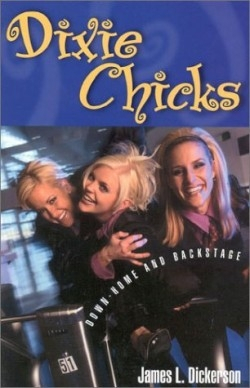Dixie Chicks
Down-Home and Backstage
Powered by Garth Brooks’ phenomenal success, country music flourished throughout the early 1990s, reaching a younger audience and selling far more records than ever before. (The famed “Class of ’89” yielded not just Brooks, but also high-selling Clint Black and Alan Jackson.) Business cooled off for country in the late ’90s, however, with pop music reasserting its dominance. As the ‘90s came to an end, most of the biggest names in country music were women “crossover” acts, notably Shania Twain, Faith Hill and those relative latecomers, the Dixie Chicks. While the Chicks didn’t surface on the record charts until 1997, they had, by the end of 1999, sold eleven million albums.
Dickerson devotes most of his book to tracing the Chicks’ journey from being a Dallas street band to being signed to a major record label. This, of course, is the story that needs to be told since the Chicks spend so little time these days talking about their years as a hardworking touring group. Like the Judds, the Chicks now relate to the media mostly through rehearsed and field-tested “quips” that project candor but forestall openness. Dickerson makes it clear, though, that the trio is solidly talented and completely its own creation—not a marketing idea fabricated by Nashville.
As true with most unauthorized biographies, this one suffers from the author’s lack of access to his main subjects. Dickerson has no interviews with the current three Dixie Chicks, their manager, or their record producers. But he has spoken with former band members, a former manager and, most significantly, with Laura Lynch, the Chick’s lead vocalist whom Natalie Maines replaced in late 1995. Without warning, Dickerson reports, sisters Martie Seidel and Emily Erwin insisted on buying Lynch out of her contract—after she had spent six years as a member of the band and after it had finally secured a Nashville record deal. Similar tales of hardball portray a group that had learned to put career ahead of sentiment.
One of the most valuable portions of Dickerson’s book is his discussion of how the Internet helped launch the Chicks toward stardom. “[I]t is there,” he contends, “that teenage girls and women in their early twenties exchanged information about the Dixie Chicks and, in essence, created a cult-like following for the group.” Just what there is about the Chicks—and not some other “girl group”—that elicits such widespread devotion is a question still being debated, particularly at competing Nashville labels. While Dickerson doesn’t provide the answer, he does show that talent, tenacity, and tough-mindedness are essential parts of it.
Reviewed by
Edward Morris
Disclosure: This article is not an endorsement, but a review. The publisher of this book provided free copies of the book to have their book reviewed by a professional reviewer. No fee was paid by the publisher for this review. Foreword Reviews only recommends books that we love. Foreword Magazine, Inc. is disclosing this in accordance with the Federal Trade Commission’s 16 CFR, Part 255.

